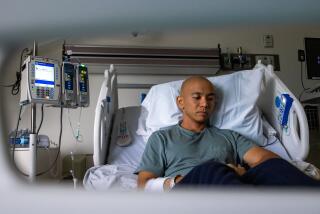Grafts Help 2 Patients Start Lives Anew : Treatment: A retired man finds he is able to travel again. A woman who had been nearly immobile has resumed her education.
Bob Orth had been a telephone lineman in Santa Rosa for more than 20 years when he started developing symptoms of Parkinson’s disease. By the time he had been on the job 30 years, he felt forced to retire “because I wasn’t doing the job properly anymore.”
In retirement, the situation worsened. Parkinson’s “plays games with you,” he said Wednesday. “Sometimes you are almost normal, other times you are very bad. Your legs are stiff, you can’t talk, (you) stutter and shake and there is a lot of pain. . . . I couldn’t answer the phone or the door and I wouldn’t go out in public” because his tremors were too embarrassing. “If we went out to eat, I would feel like a fool trying to stay in the booth.”
Finally, “at the point of no return,” Orth heard about Dr. Curt R. Freed’s experimental use of fetal cell transplants at the University of Colorado. After many preliminary tests, he underwent surgery on Aug. 29, 1991. He paid for the surgery with help from local donors and from high school classmates in Wisconsin who held a benefit to raise funds. Because the procedure is considered experimental, his insurance did not cover it.
Shortly after he came home from the surgery, he had a relapse into severe symptoms similar to that of many other brain-graft patients; the procedure seems to have a delayed effect in many cases. “I was feeling pretty gloomy,” he said. “I didn’t think it worked.” But after six weeks, he began to improve, growing confident in both walking and talking. He and his wife began dining out again and he would answer the door and the phone.
This summer, Orth and his mother-in-law drove a motor home from Santa Rosa to Wisconsin for a vacation. “I was able to take care of myself for the first time in a long time--buying groceries, filling the car with gas and driving. I tried golf and played nine holes several times. I did a lot of fishing and even tried trap shooting. I did quite well there.”
Orth still has “ups and downs,” but his disease is “much more controllable.” Now he wants to spread the word. “We’re trying to get a message to people that the operation is beneficial. Some cases are better than others. But no matter what small improvement you get, it’s worth it.”
Juanita Lopez has quite a different success story. She was heavily into the San Francisco drug scene 10 years ago, but she did not expect to pay such a heavy penalty. But she once injected a dose of synthetic heroin contaminated with a chemical called MPTP, which selectively destroyed the portions of her brain that control muscle function.
Within a week, her body was motionless--”completely frozen to the bone,” she said Wednesday. Use of the drug L-dopa restored a limited amount of mobility, but over the next seven years, her condition deteriorated until she was no longer able to walk, talk, feed herself or carry out any of the other functions of daily life. She lived with her mother (who died recently) on the Chippewa Cree reservation in Montana.
Three years ago, at the urging of Dr. J. William Langston of the California Parkinson’s Foundation in San Jose--who discovered the effects of MPTP and has continued to monitor people exposed to it--she flew to University Hospital in Lund, Sweden, for a fetal tissue implant.
At first, she was very disappointed because she “didn’t feel any different.” It was not until a year later that she could tie her own shoes again. Over the next eight months, she started eating normally, bathing herself, sweeping and mopping the floor, doing dishes and accomplishing the hundreds of small household tasks that most people take for granted.
Lopez, now 40, has since enrolled at Stonechild College on the Chippewa Cree reservation, where she is studying for a high school degree and taking college-level courses in English and writing. A month ago, the tribal elders gave her her own house, where she is now “completely independent.”






